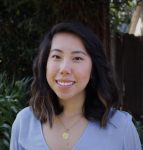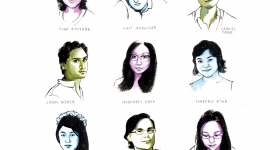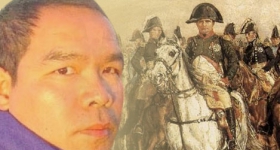In Weike Wang’s novel Chemistry, uncertainty clouds the unnamed narrator’s professional and personal lives as she weighs finishing her Ph.D. in chemistry (and thus succeeding in her parents’ eyes) against marrying her boyfriend, Eric. She opens the novel with this: “The boy asks a girl a question. It is a question of marriage. Ask me again tomorrow, she says, and he says, That’s not how this works.”
Wang herself holds a B.S. in chemistry from Harvard, a doctorate in public health and an M.F.A. in creative writing at Boston University. In 2017, Chemistry won the PEN/Hemingway award and was nominated as one of the best books of the year from NPR, Entertainment Weekly, Ann Patchett on PBS NewsHour, Minnesota Public Radio, PopSugar, Maris Kreizman, and The Morning News. It is also the winner of the Ploughshares’ John C. Zarcharis Award, Whiting Award, and a Belletrist Amuse Book.
At first glance Wang seems to sprinkle random scientific facts throughout the novel: at one point, the narrator will tell us that diamond is no longer the hardest mineral known to man. Later she’ll tell you that to completely rid a body of radium, one must cremate it then boil it in hydrochloric acid. And still later, she’ll explain that when a woman gives birth, she releases large amounts of oxytocin, a hormone that helps with maternal bonding, the “source of love and prosperity.” As the novel progresses, the reader gradually becomes aware that these facts reflect the workings of the narrator’s mind.
The narrator is extremely self-aware with a consciousness that is perhaps her own biggest enemy, an enemy that can draw from both internal and external factors and voice them through steps of the scientific method. She hypothesizes, analyzes and draws a conclusion, giving us insights into her raw train of thought. Wang allows us to enter the narrator’s intimate headspace, where we discover that while chemistry alludes to love, it is also a metaphor for the narrator’s conflicted feelings about her family and culture. “You must love chemistry even when it is not working,” the narrator tells us. “You must love chemistry unconditionally.”
The narrator’s father is a classic immigrant story of success, and she feels that she “must conquer the moon,” in order to feel only the slightest bit of success compared to him. While she feels close to both cultures, there are moments of culture clash indicated through scenes of flashbacks. The first time occurs when our narrator tells us that in traditional Chinese culture, the bride gets married in red. She recalls a time from the summer before, where she passes by a qipao store:
The owner catches her attention by claiming she looks skinny from afar and offers a free fitting. When the dress is on, she tells our speaker her shoulders are too broad and suggests that she wear an A-line instead. Our narrator describes the traditional Chinese dress as difficult to walk in, legs bound together, made up of a constricting fabric. Although unfitting and uncomfortable for her to wear, the narrator still purchases the dress. This moment suggests the narrator’s feeling of unwearable distance towards her own culture, yet she purchases the dress anyway because it still is her own culture.
At another point in the novel, Eric chooses to speak to the narrator’s mother (whose first language is Mandarin) in English. He argues with the narrator, claiming, “If she lives here [America], she is expected to speak the language.” This moment unmasks Eric’s innate thoughts towards assimilation — that their mother tongue is obsolete if her immigrant parents choose to live in America. If our speaker is to be with Eric, she must choose to be American first before being Chinese, and thus completely scrap her identity and attaining the Ph.D. Throughout this process, she describes the slow loss of her Chineseness as if it’s “flaking off [her] like dead skin.”
These instances are strategically placed throughout the novel, nuanced through metaphor and inner dialogue, allowing the reader to pick up on the narrator’s conflicted headspace until the very end — when she must choose a side, a decision which feels nearly impossible, as she tells us: "The optimist sees the glass half full. The pessimist sees the glass half empty. The chemist sees the glass completely full, half in liquid state and half gaseous, both of which are probably poisonous."










Comments